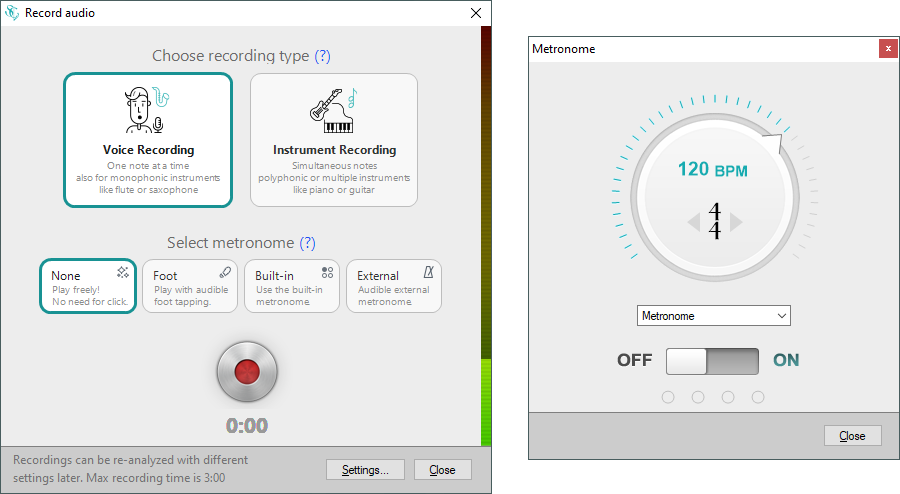Recording or importing audio with ScoreCloud Studio

Choose Recording Type
Choose recording type based on if you’re playing one note at a time, or an instrument with simultaneous notes.
Voice Recording
Choose voice mode for single note melodies or basslines (monophonic), such as vocals, bass, flute etc.
Playing one note at a time on guitar or piano also works well in Voice Recording, as long as the sustain of the notes doesn’t overlap the next note too much.
Instrument recording
Choose instrument mode if the recording has multiple notes at a time (polyphonic), for example guitar, piano, chords, multiple voices, etc.
Select Metronome
✨ None
Sing or play freely, in ScoreCloud there is usually no need to play with a metronome at all!
🦶 Foot-Tapping Detection
You can help the analysis by tapping your foot while you play. The program will listen for a deeper stomp sound, so make sure it is picked up by the microphone.
Make sure your recording is long enough for the program to understand the pulse. “Noise Cancellation” can filter out the foot-tapping sound, see if you can turn it off in your system Audio Settings.
🕛 Built-in Metronome
Play with the program’s own metronome, preferably using headphones. Choose between built-in click sounds and drum patterns to sync the song to your selected time signature.
🕰️ External Metronome Detection
Using a drum machine or a metronome in the room? Select “External Metronome” and the program will separate percussive sounds to help with metric analysis. You can also use this setting when clapping your hands or snapping your fingers on the beats.
Add a click-track after recording
If you record without a metronome, you can add a click-track after the fact to help the analysis interpret your recording. Click the Tap Beat button in the Listener to add click-track markers to your snippet.
Tips for better results:
- About the analysis
ScoreCloud does not know any songs – it attempts to analyze the musical structure like someone who never heard the song or musical style before. Singing or playing clearly and organically generally gives better results. - Slower tempo
ScoreCloud does not know that your foot is tapping. If you play or sing something that really needs accompaniment you will probably get an unexpected score. Keeping a steady pulse helps. - No lyrics or ornaments
You generally get better results from singing if you sing without lyrics since there can be unclear note onsets in vocal performance with lyrics. Singing with Da-da etc. is easier for ScoreCloud to understand. - Keep a steady tempo
Sing or play fast songs a little slower and leave out ornamentation or ”wailing”. Short notes are generally not so clear in intonation and can be difficult to separate from slides and noise. Tap beat in snippet after recording to set tempo. See ”tap beat” - Try different microphone setups
Experiment with the placement of the microphone and listen to your sound. You generally get better results if you do not sing, whistle or play very loud close to the microphone and soft far from the microphone, but it depends also on the background noise and the reverberation in the room. - Keep it simple
If you want the notation to be rhythmically simple, try not to cut-off or prolong phrase endings too much; let the beat continue and keep the duration of the notes.
Video on how to use audio recording in ScoreCloud Studio:
Learn more
Check out our other tutorial videos on how to use ScoreCloud Studio.
